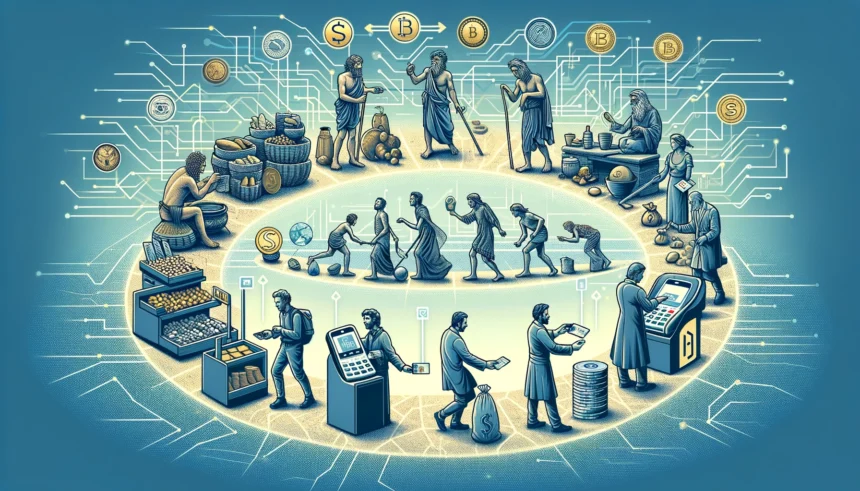Explore the intricate tapestry of innovations that fintech has woven into the fabric of our daily lives, ensuring that your financial interactions are not just transactions, but a seamless part of your everyday experience.Copy HTMLCopy text
The Dawn of Digital Payments: A New Era Begins
The role of fintech in shaping the future of payments cannot be understated. As we move forward, the focus is increasingly on creating more personalized and seamless payment experiences. This involves leveraging data analytics and machine learning to understand consumer preferences and predict future trends.
Experts predict that the next wave of innovation will likely include more integrated and interoperable payment systems, further blurring the lines between different financial services. The ongoing evolution of digital payments is a testament to fintech’s transformative potential, signaling a new era of commerce that is more dynamic, accessible, and secure.
Mobile Wallets and Apps: Revolutionizing Everyday Transactions
Exploring the landscape of modern commerce, it’s evident that mobile wallets and payment applications have significantly altered the way consumers interact with financial services. These platforms not only offer convenience but also enhance security and efficiency in transactions. A notable case study is the exponential growth of Apple Pay, which, since its inception, has transformed mobile payments into a seamless, ubiquitous part of everyday life for millions of users worldwide. This evolution underscores the critical role fintech has played in redefining the boundaries of digital commerce.
Blockchain and Cryptocurrency: The Future of Secure Payments
Adoption of these technologies is rapidly expanding beyond the realm of niche enthusiasts to mainstream markets, signaling a significant shift in how future transactions will be conducted.
The role of fintech companies in this transition cannot be overstated; they are at the forefront of developing user-friendly platforms that integrate cryptocurrency payments into everyday commerce.
This not only democratizes access to secure and efficient payment methods but also encourages innovation in a sector that has been ripe for disruption. As regulatory frameworks around the world begin to catch up with these advancements, the potential for blockchain and cryptocurrency to become the backbone of a new, more secure payment ecosystem is increasingly becoming a reality.
The Impact of AI and Machine Learning on Payment Technologies
Advancements in AI and machine learning are revolutionizing the way we approach payment technologies, offering unprecedented levels of efficiency, security, and personalization.
These technologies are not just transforming the operational aspects of payment systems but are also enhancing the user experience by making transactions faster, more secure, and highly customized.
Experts in the field emphasize the importance of leveraging AI to analyze vast amounts of data, which in turn helps in detecting fraudulent transactions with greater accuracy and in real-time, thereby significantly reducing the risk of financial losses.
Peer-to-Peer Payment Systems: Simplifying Money Transfers
Peer-to-Peer (P2P) payment systems have revolutionized the way we think about financial transactions, offering a streamlined and user-friendly approach to transferring money. Experts in the field emphasize the importance of security and ease of use as critical factors driving the adoption of these platforms. With the advent of fintech innovations,
P2P payment systems have become more than just a convenience; they are now a fundamental component of digital commerce, enabling instant transactions without the need for traditional banking intermediaries.
This shift not only enhances user experience but also fosters a more inclusive financial ecosystem, allowing individuals to manage their finances with unprecedented flexibility and efficiency. As these systems continue to evolve, the focus on integrating advanced security measures and improving user interface will remain paramount, according to industry leaders.
Regulatory Challenges and Opportunities in the Fintech Space
Fintech innovations have significantly transformed the way financial transactions are conducted, yet they also bring forth a unique set of regulatory challenges and opportunities. One of the most pressing issues is the need for a regulatory framework that can keep pace with technological advancements.
This is crucial for protecting consumers, ensuring fair competition, and fostering innovation.
Regulators are tasked with the delicate balance of preventing financial crimes such as fraud and money laundering, while also providing room for fintech companies to innovate and grow. The dynamic nature of fintech means that regulations must be both robust and adaptable.
Addressing the regulatory challenges in the fintech space involves several key steps:
- Developing a clear regulatory framework that is specific to fintech, which can provide clarity and certainty for all stakeholders.
- Encouraging collaboration between fintech companies, traditional financial institutions, and regulatory bodies to share knowledge and best practices.
- Investing in RegTech solutions to streamline compliance processes and enhance the ability to monitor and respond to risks.
These measures can help in creating a regulatory environment that supports innovation while ensuring the financial system remains secure and trustworthy.
The Road Ahead: Emerging Trends in Payment Solutions
With the rapid evolution of technology, the future of payment systems is poised for significant transformation. Fintech’s role in shaping commerce has never been more critical, as businesses and consumers alike demand faster, more secure, and more convenient payment methods. Among the most promising developments are:
- Blockchain technology – Offering unparalleled security and transparency, blockchain is set to revolutionize how transactions are processed.
- Biometric authentication – Enhancing security and user experience by using unique biological traits for verification.
- Smart contracts – Automating and streamlining payment processes in a trustless environment.







